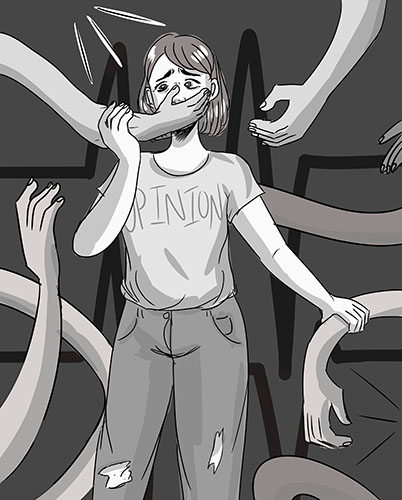Desire to remain likeable suffocates opinions, hinders progress

Illustration by Erin Zhou
March 15, 2019
Last year, in the wake of the Sutherland Springs, Texas and Las Vegas shootings, I decided I wanted to write a column about gun control. I was new to the opinions section and column writing, and I had never written a column about something I was passionate about, let alone a very heavy topic. I went into the process full of frustration at the crisis and potential solutions, excited to finally write my thoughts down, and re-read the end result when the paper came out. Frankly, I was pissed.
At myself, that is. What I had gone into that column with the intention to share — the hard-hitting facts about Japanese gun control, the stories of victims and their families, the true definition of the second amendment — was phased out at some point in the process. It’s not like I hadn’t put effort into the column — I’d spent hours doing research, building a basis for my thoughts and piecing the column together to make it as convincing as possible. My need to be liked, however, had done me in.
I joined this section because, well, I’m full of opinions: I wear the editorial board merch that reads “OPINIONS” with pride. I have the power to write about absolutely anything I want, but it seems that every time I brainstorm a column idea, I refrain from taking risks. While I tend to write about things that intrigue me, I also tend to write about things that are definitively agreeable. As someone who likes to stir the pot, I put the spoon down when it came to what I wrote about — I wanted people to agree with me. I wanted people to like me, and conversely, like what I have to say.
This isn’t just the case with my writing. There are times when I voice what I do have to say, but I more frequently find myself agreeing with the other person or changing my views just so I’m not disagreeing too much. It reaches farther than discussions about controversial topics: in arguments, I quickly resort to conceding, apologizing and being glad the other person isn’t angry anymore, and it all stems from the need to remain likeable and remain, in the eyes of someone else, as agreeable as possible. And I’ve reached the point where it’s driving me insane.
I’m not saying compromise is a bad thing. This is about concession, not compromise. It’s crucial to say what you have to say and stick up for what you believe in, not only in this political climate but in general day-to-day interactions. From there comes the compromise: have discussion, figure out where everyone stands, and then make some concessions afterwards. But you can’t make the concessions immediately, and most definitely not all at once, and that’s the road I’ve always tended to follow because it’s palatable. It’s the easy way out.
I feel like a doormat. Excessive agreeability is no way to live and it’s no way to achieve the change you want to achieve, whether you’re figuring out who owes who with your friends or finding the next way to alleviate poverty.
Consequently, here are some things I’d like to get off my chest: many proposed government programs written off by right-wing politicians as “socialist” would really increase the potential for upward mobility in this country, those who think climate change isn’t a big deal are selfish, know it’s a pretty big deal, and just don’t want to change their lifestyle for a crisis that won’t immediately affect them, and A Star Is Born is a trash movie about an extremely toxic relationship. Go get something off your chest and stir the damn pot.


